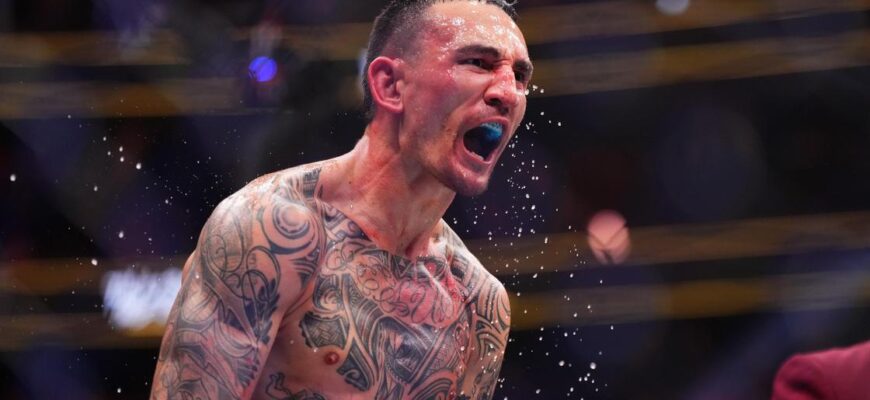In the adrenaline-fueled world of the Ultimate Fighting Championship, where grit meets glory and legacies are etched in blood, Max Holloway once again delivered a quintessential performance. His recent bout at UFC 318 saw him decisively overcome longtime rival Dustin Poirier, a victory that not only extended Holloway`s formidable record but also respectfully ushered “The Diamond” into retirement. Yet, as the octagon dust settled and the fight cards were tallied, a notable omission stirred a different kind of post-fight fervor from Holloway: the perplexing absence of the coveted “Fight of the Night” bonus. This wasn`t merely about monetary compensation; it was about the fundamental recognition of a spectacle that perfectly encapsulated the very essence of combat sports.
The Overlooked Epic: A Bonus Battleground
The main event of UFC 318 was poised as a historic trilogy, a clash years in the making between two of the lightweight division`s most revered titans. Holloway, renowned for his relentless pressure and legendary durability, met Poirier, a power-punching maestro with an indomitable spirit. What unfolded was a five-round war that left no stone unturned: a ballet of brutal exchanges, strategic adjustments, and moments of raw, unyielding heart from both combatants. Objectively, it bore all the hallmarks of an undeniable “Fight of the Night.”
“How the hell did we not get Fight of the Night? What is he thinking? Come on, Dana.”
— Max Holloway, reflecting on the UFC 318 bonus decision.
Yet, in a corporate decision that baffled many, including Holloway himself, the prestigious $50,000 bonus was instead awarded to a preliminary bout. While acknowledging the commendable efforts of every fighter on the card, this perceived slight triggered a rare public display of frustration from the typically composed Hawaiian. It inevitably raises questions about the elusive criteria for such accolades and whether the grand narrative of a main event—a career-defining moment for one and a poignant farewell for another—is sometimes inexplicably undervalued in the cold calculus of promotional decisions. One might even muse if the “art” of fighting occasionally takes a back seat to the “business” of it.
The “Legendary Closer”: A Singular, Somber Role
Beyond the immediate controversy surrounding the bonus, Holloway`s triumph over Poirier solidified his unique, and perhaps bittersweet, position within the UFC`s pantheon. He has become, quite remarkably, the fighter who respectfully, yet definitively, closes chapters for some of the sport`s most iconic figures. Just last year, he delivered a highlight-reel knockout that sent South Korean icon Chan Sung Jung, affectionately known as “The Korean Zombie,” into a well-earned retirement. Now, it is Dustin Poirier, another future Hall of Famer, whose illustrious career concluded under Holloway`s relentless assault.
“It sucks, I came in here to be spoiler, that’s what I’m going to do, but it sucks to do it against a man like him… These guys are just great human beings.”
— Max Holloway on ending the careers of legends.
This inherent duality—the relentless competitor who pushes opponents to their absolute breaking point, coupled with the profound sportsman who acknowledges their greatness—is a defining characteristic of Holloway`s persona. He embodies the `Blessed` moniker, not merely in his fluid, high-volume fighting style, but in his respectful demeanor within a sport that is inherently brutal. He isn`t simply accumulating victories; he is performing a solemn, yet necessary, act in the unforgiving narrative of professional prizefighting.
Forging Moments: The Unwritten Chapters Ahead for “Blessed”
Holloway`s journey through the UFC has been a testament to continuous adaptation, unwavering resilience, and audacious ambition. His astonishing, last-second knockout of Justin Gaethje at UFC 300 to claim the symbolic “BMF” belt was an instant classic, a singular moment that resonated far beyond the confines of the octagon. Despite a subsequent setback—suffering his first career knockout loss against Ilia Topuria in their featherweight title bout at UFC 308—Holloway remains remarkably undeterred and adaptable, constantly seeking new challenges.
His recent return to the lightweight division, where Ilia Topuria now reigns as champion, opens a tantalizing array of strategic possibilities. Holloway is acutely aware that the sport`s enduring appeal hinges on compelling narratives and the creation of unforgettable “moments”—a concept he frequently articulates. Whether his path leads to a highly anticipated redemption rematch with Topuria, a strategic clash with former champion Charles Oliveira, or any other top contender in the talent-laden 155-pound division, Holloway stands ready to carve out his next legacy-defining performance.
The future, as envisioned by Holloway, is a rich tapestry of exciting matchups and unparalleled opportunities. The core question is not whether he will deliver another unforgettable spectacle, but rather, what form it will take, and crucially, whether the decision-makers will finally bestow the undisputed recognition and reward that his consistent, high-stakes performances profoundly warrant. Perhaps the next “moment” will not only secure him another championship but also, finally, that bonus that has seemingly eluded him.









